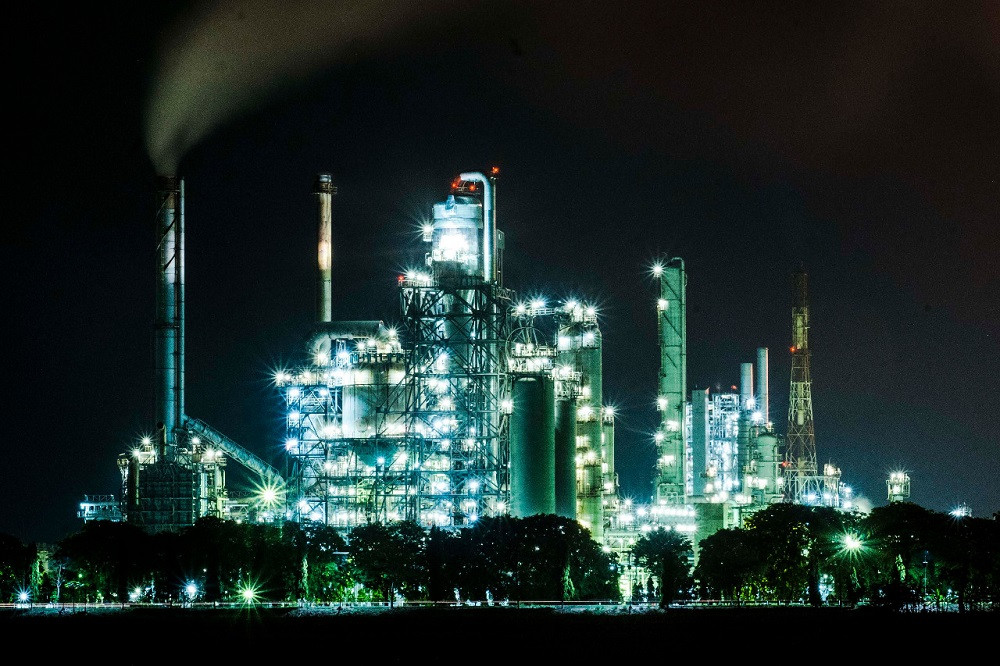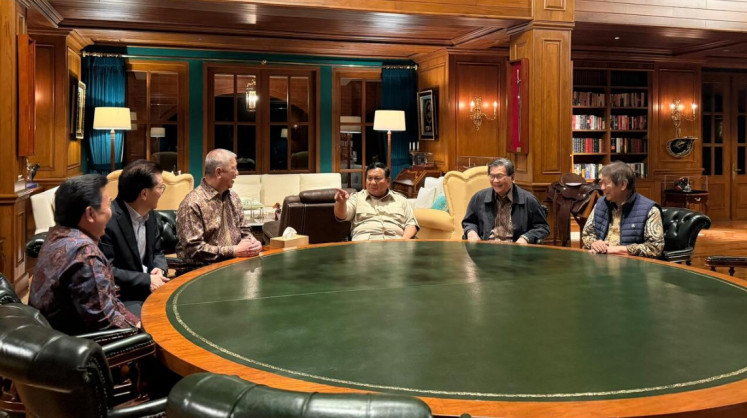Popular Reads
Top Results
Can't find what you're looking for?
View all search resultsPopular Reads
Top Results
Can't find what you're looking for?
View all search resultsReturn oil and gas mining authority to Pertamina
Pertamina should be given the mining licensing authority and the authority to conclude contracts with foreign investors and the national private sector through a simple business-to-business production sharing contract.
Change text size
Gift Premium Articles
to Anyone
T
he latest issue of the Global Fortune 500 for 2019 does not include Pertamina, a stateowned enterprise (SOE) established under Law No. 8/1971 as a result of the merger of two SOEs — Permina engaged in the upstream sector and Pertamin in the downstream sector.
Indonesian oil production has declined steadily since the late 1990s due to lack of investment in explorations, even though there are still about 50 billion barrels of potential oil resources and around 100 trillion cubic feet of gas potentials trapped under around 120 basins (sedimentary basins) across the country. Likewise, the oil refinery industry also has been stagnant with 1 million barrel daily capacity. Consequently, Indonesia has become a net oil importer.
The steady decline in the oil industry worsened after the enactment of Oil and Gas Law No.22/2001 at the recommendation of the International Monetary Fund, which drastically changed the governance of the petroleum industry.
Law No. 22/2001 transfers the oil mining authority from Pertamina to the Energy and Mineral Resources Ministry. Pertamina was transformed into a conventional SOE incorporated with a notary deed, no longer governed under a special law.
The law replaces the simple, non-bureaucratic awarding of oil and gas mining contracts under Law No. 8/1971 with a complicated bureaucratic system, where the government concludes contracts with oil and gas business actors through a “business-togovernment” mechanism. Law No.22/2001 virtually violates the 1945 Consitution, notably its article 33 on the management of natural resources.
The Constitutional Court has revoked dozens of articles in the 2001 Oil and Gas Law and dissolved the BP Migas regulatory agency, which was later renamed the SKKMigas task force, but with the same status and authority as BP Migas. The House of Representatives has since 2009 tried to amend the 2001 law but has failed until now.
In my opinion, the solution to the crisis is the restoration of the oil mining authority to Pertamina, as that under Law No. 8/1971. This is in line with the 1945 Constitution which states, among other things, that oil and gas exploitation can only be conducted by the state and the executor of its exploitation shall be a state company.
Empirical experience has shown that the petroleum industry performs very poorly when the mining authority is in the hands of the government as it is now. The reason is simple: The oil and gas investment system and process becomes complicated and bureaucratic, while the government is not eligible to carry out oil and gas mining and the oil and gas business.
Read also: 75 years later, with Indonesia’s oil industry in decay, options are wide open
Pertamina should be given the mining licensing authority and the authority to conclude contracts with foreign investors and the national private sector through a simple business-to-business production sharing contract.
The oil and gas business actors who contract with Pertamina are guaranteed economic rights in the form of cost recovery and the agreed upon profit sharing. Then Pertamina takes care of all the permits required by the contractor to carry out oil and gas exploration and production activities. Therefore, the investment system and process becomes simple, not excessively bureaucratic.
Under Pertamina Law No. 8/1971, investment in oil and gas exploration increased dramatically, oil production increased sharply, from 200,000 barrels per day in the 1960s to around 1.7 million bpd from the 1980s to 1990s. The oil and gas sector was the largest source of export foreign exchange earnings and the largest source of state budget revenue.
Only state companies, not government agencies, can run the oil and gas business, such as mining, construction of oil refineries and fuel sales throughout Indonesia, the development of LNG plants (Arun and Badak) with a value of billions of US dollar without using state budget funds in the 1970s, but with the financing of bank loan consortiums. This could happen because foreign banks and global oil companies trusted Pertamina as the mining authority holder in charge of developing hydrocarbon reserves.
Only state companies or companies are entitled to take over expired oil and gas concessions without going through complicated bureaucratic processes and without having to pay signature bonuses and commitments of up to $1.28 billion, as Pertamina
did in the Rokan block. Pertamina was forced to issue global bonds in Singapore, something that should not have happened, if Pertamina held the mining authority. The Rokan block would have automatically been returned and operated by Pertamina when its contract expired.
I am sure Pertamina as the mining authority holder would easily enter the Fortune Global 500 in a ranking much higher than the 178th ranking it achieved in 1998 at number 178.
For this reason, we urge the government and House now deliberating the omnibus bill on job creation to revise Law No.22/2001 and return the mining authority to Pertamina.
The government should focus its role as policymaker and regulator and supervise Pertamina in carrying out mining concessions and implementing government policies such as: fulfilling the need for fuel at a price set by the government, one price fuel policy, reducing oil and gas imports, as well as processing palm oil into biofuel.
***
Director of the Center for Petroleum and Energy Economics Studies and alumnus of the Colorado School of Mines and Institut Francaise du Petrole










